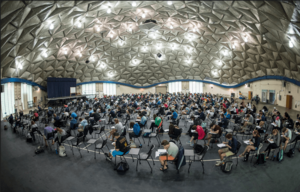 "
"
“Most students will tell you that they don’t test well,” Don Bishop, associate vice president for undergraduate enrollment at Notre Dame, said. “In America, if their test is below the top 1%, they usually say they don’t test well.”
As the admissions process seems to grow more selective, it has evoked a national dialogue about the utility of evaluating candidates based on a singular day’s performance, especially when it might be impacted by factors that not all students have equitable access to, such as test prep courses or specialized tutors.
The pressure to deemphasize the importance of an applicant’s test score, plus the bevy of obstacles to administering standardized tests posed by COVID-19, created the maelstrom necessary for many schools, including Notre Dame, to enact test optional policies for those applying in 2021.
But, Notre Dame had been considering a policy shift for at least two years, before the pandemic was on anyone’s mind, according to Bishop. The research arm of the undergraduate enrollment division had gone on trips to several test optional institutions — including Bowdoin, which stopped requiring test scores in 1969, and the University of Chicago, one of the most recent of the top 15 private universities in the U.S. to make the switch — to identify whether Notre Dame wanted to adopt the system.
“Our theory was that testing was being overused for selection to nobody’s benefit,” Bishop said. “Overused is the word I want to stress — it’s not that any use of the test is invalid, but the overuse of the test was giving you false goods, if you will. Greatness only defined by test scores is not greatness.”
Bishop may be one of the most qualified people at this university to make that judgment. In the past 33 years, he has held senior positions in student enrollment at five different universities, including Cornell and Ohio Wesleyan.
“I use stats to prove you should use them less,” Bishop joked while explaining that his research on student selection systems demonstrates that a student’s test score does not have a high predictive value for their success in college.
“The correlation coefficient for SAT scores predicting GPA in college is around 13%,” Bishop said, while that of high school class performance is about 28%. “So it was a little bit more than, you know, maybe two, two and a half times more predictive to just look at your grades and courses that you took.”
Bishop’s findings echo the sentiments of many students who feel that standardized tests fail to illustrate their true capabilities.
Grace McKenna, who applied for a spot in Notre Dame’s class of 2025, said that Notre Dame’s test optional policy made her feel hopeful, as she has “always struggled with long standardized tests with what [she] feel[s] is information that is irrelevant to judging what kind of a student you are.”
McKenna did not submit test scores with her application, and neither did approximately 50% of the 2025 applicant class, according to Bishop. He doesn’t believe this to be an unusually high number, as other peer institutions are reporting similar statistics. But, he added that in a regular year, they expected only 10% to 15% of applicants would elect not to submit test scores.
Although COVID-19 is likely to have contributed some unforeseen dynamics, Bishop said there are already positive trends emerging due to the change. Application readers have had to spend longer assessing applications — he estimates approximately 50% more time — because they can no longer rely on test scores to help them make quick differentiations between candidates. Instead, the “admissions team seems to be making greater distinctions between applicants because of the rigor of their curriculum,” Bishop said.
He also noted that Notre Dame has seen an increase in applications from both low-income and first-generation students, a development he said was part of the reason Notre Dame was attracted to a test optional policy.
“Where I like test optional is if it encourages students who have been self-selecting themselves out of the applicant pool at top schools,” a phenomenon Bishop said happens among low-income students who tend not to be able to prepare for standardized tests in the same way that their more affluent peers might.
But Bishop also fears that by foregoing tests, some students might lose out on an important learning experience: “If you have the right attitude about testing, and you’re willing to be somewhat self critical and constructive in that self criticism, and then you build a plan around that, it could be a good thing to take tests.”
Regardless, Bishop said Notre Dame is committed to becoming less reliant on test scores. In 2005 and 2010, the university admitted about 84% of the top 3000 test scorers. In 2020, the number dropped to about half. Now that the university has announced it’ll remain test optional for the 2022 and 2023 application cycles, it’s further affirming that commitment.
“Certain colleges overuse the testing to make themselves look more important than they are,” Bishop said. “Notre Dame has chosen not to worry about that; we’re comfortable in our own skin and we’re convinced that we have greater wisdom than caving to the pressure of having a higher test score average.”